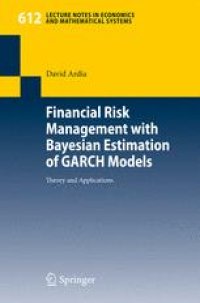
Ebook: Financial Risk Management with Bayesian Estimation of GARCH Models: Theory and Applications
Author: Dr. David Ardia (auth.)
- Tags: Econometrics, Financial Economics, Statistics for Business/Economics/Mathematical Finance/Insurance, Quantitative Finance
- Series: Lecture Notes in Economics and Mathematical System 612
- Year: 2008
- Publisher: Springer-Verlag Berlin Heidelberg
- Edition: 1
- Language: English
- pdf
For his excellent monograph, David Ardia won the Chorafas prize 2008 at the University of Fribourg Switzerland.
This book presents methodologies for the Bayesian estimation of GARCH models and their application to financial risk management. The study of these models from a Bayesian viewpoint is relatively recent and can be considered very promising due to the advantages of the Bayesian approach, in particular the possibility of obtaining small-sample results and integrating these results in a formal decision model. The first two chapters introduce the work and give an overview of the Bayesian paradigm for inference. The next three chapters describe the estimation of the GARCH model with Normal innovations and the linear regression models with conditionally Normal and Student-t-GJR errors. The sixth chapter shows how agents facing different risk perspectives can select their optimal Value at Risk Bayesian point estimate and documents that the differences between individuals can be substantial in terms of regulatory capital. The last chapter proposes the estimation of a Markov-switching GJR model.
For his excellent monograph, David Ardia won the Chorafas prize 2008 at the University of Fribourg Switzerland.
This book presents methodologies for the Bayesian estimation of GARCH models and their application to financial risk management. The study of these models from a Bayesian viewpoint is relatively recent and can be considered very promising due to the advantages of the Bayesian approach, in particular the possibility of obtaining small-sample results and integrating these results in a formal decision model. The first two chapters introduce the work and give an overview of the Bayesian paradigm for inference. The next three chapters describe the estimation of the GARCH model with Normal innovations and the linear regression models with conditionally Normal and Student-t-GJR errors. The sixth chapter shows how agents facing different risk perspectives can select their optimal Value at Risk Bayesian point estimate and documents that the differences between individuals can be substantial in terms of regulatory capital. The last chapter proposes the estimation of a Markov-switching GJR model.
For his excellent monograph, David Ardia won the Chorafas prize 2008 at the University of Fribourg Switzerland.
This book presents methodologies for the Bayesian estimation of GARCH models and their application to financial risk management. The study of these models from a Bayesian viewpoint is relatively recent and can be considered very promising due to the advantages of the Bayesian approach, in particular the possibility of obtaining small-sample results and integrating these results in a formal decision model. The first two chapters introduce the work and give an overview of the Bayesian paradigm for inference. The next three chapters describe the estimation of the GARCH model with Normal innovations and the linear regression models with conditionally Normal and Student-t-GJR errors. The sixth chapter shows how agents facing different risk perspectives can select their optimal Value at Risk Bayesian point estimate and documents that the differences between individuals can be substantial in terms of regulatory capital. The last chapter proposes the estimation of a Markov-switching GJR model.
Content:
Front Matter....Pages I-XIII
Introduction....Pages 1-7
Bayesian Statistics and MCMC Methods....Pages 9-15
Bayesian Estimation of the GARCH(1, 1) Model with Normal Innovations....Pages 17-37
Bayesian Estimation of the Linear Regression Model with Normal-GJR(1, 1) Errors....Pages 39-54
Bayesian Estimation of the Linear Regression Model with Student-t-GJR(1, 1) Errors....Pages 55-71
Value at Risk and Decision Theory....Pages 73-107
Bayesian Estimation of the Markov-Switching GJR(1, 1) Model with Student-t Innovations....Pages 109-153
Conclusion....Pages 155-159
Back Matter....Pages 161-203
For his excellent monograph, David Ardia won the Chorafas prize 2008 at the University of Fribourg Switzerland.
This book presents methodologies for the Bayesian estimation of GARCH models and their application to financial risk management. The study of these models from a Bayesian viewpoint is relatively recent and can be considered very promising due to the advantages of the Bayesian approach, in particular the possibility of obtaining small-sample results and integrating these results in a formal decision model. The first two chapters introduce the work and give an overview of the Bayesian paradigm for inference. The next three chapters describe the estimation of the GARCH model with Normal innovations and the linear regression models with conditionally Normal and Student-t-GJR errors. The sixth chapter shows how agents facing different risk perspectives can select their optimal Value at Risk Bayesian point estimate and documents that the differences between individuals can be substantial in terms of regulatory capital. The last chapter proposes the estimation of a Markov-switching GJR model.
Content:
Front Matter....Pages I-XIII
Introduction....Pages 1-7
Bayesian Statistics and MCMC Methods....Pages 9-15
Bayesian Estimation of the GARCH(1, 1) Model with Normal Innovations....Pages 17-37
Bayesian Estimation of the Linear Regression Model with Normal-GJR(1, 1) Errors....Pages 39-54
Bayesian Estimation of the Linear Regression Model with Student-t-GJR(1, 1) Errors....Pages 55-71
Value at Risk and Decision Theory....Pages 73-107
Bayesian Estimation of the Markov-Switching GJR(1, 1) Model with Student-t Innovations....Pages 109-153
Conclusion....Pages 155-159
Back Matter....Pages 161-203
....